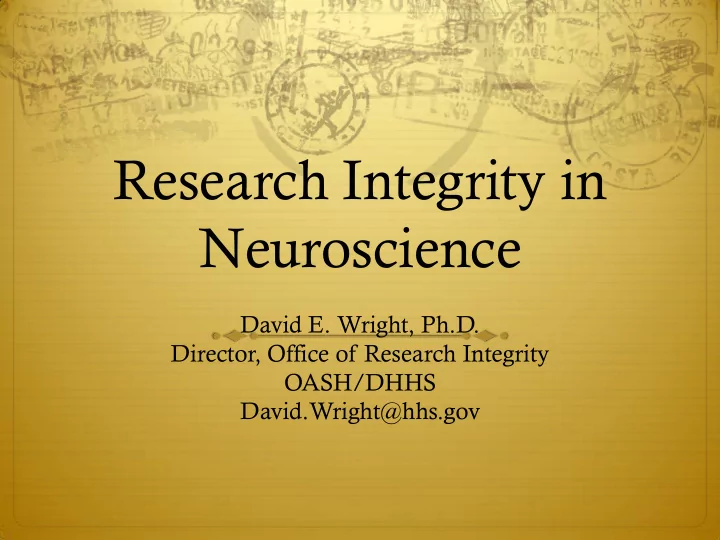

Research Integrity in Neuroscience David E. Wright, Ph.D. Director, Office of Research Integrity OASH/DHHS David.Wright@hhs.gov
ORI’s Mission Mission: To promote the integrity of PHS-supported extramural and intramural research programs by administering the PHS Research Misconduct Regulation, 42 CFR Part 93 and Responding effectively to allegations of research misconduct Promoting research integrity
Definition of Research Misconduct Fabrication is making up data or results and recording or reporting them Falsification is manipulating research materials, equipment, or processes, or changing or omitting data or results such that the research is not accurately represented in the research record
Definition of Research Misconduct Plagiarism is the appropriation of another person’s ideas, processes, results, or words without giving appropriate credit Research misconduct does not include honest error or differences of opinion (42 CFR Part 93.103)
Some ORI Statistics 1992 to 2010* statistics: Total misconduct findings 224 Findings involving clinical research ~30% Total accessions from 1992 4377 Total cases opened from 1992 580 Total cases closed from 1992 630 Total Allegations per year before 2007 =225 Total Allegations per year in 2012-3=425
Percent of Cases Involving Images 80.0 70.0 Percent of Cases 60.0 50.0 40.0 30.0 20.0 10.0 0.0 89-'90 91-'92 93-'94 95-'96 97-'98 99-'00 01-'02 03-'04 05-'06 07-'08 2-Year Reporting Period
Research Integrity Issues in Emerging Fields Such As Neuroscience Research misconduct issues are mostly the same across disciplines and fields of research regardless of their maturity . . . With some nuances
Research Integrity Issues in Emerging Fields Such As Neuroscience In newly emerging fields there may be techniques that grant and journal reviewers are not yet familiar with that could make detecting F or F harder.
Research Integrity Issues in Emerging Fields Such As Neuroscience On the other hand, in “hot” new fields more and more people are watching developments closely making it more likely that misconduct might be discovered.
Research Integrity Issues in Emerging Fields Such As Neuroscience Hot new fields attract lots of new people in pursuit of funds and fame and create intense competition. That combination may make misconduct more likely. As money pours into emerging fields where new discoveries can have near-term applications in medicine or industry, conflict of interest issues may become more prominent.
Research Integrity Issues in Emerging Fields Such As Neuroscience In clinical neuroscience publications have evolved from case reports to results of hypothesis driven research. F & F may increase according.
Preventing Research Misconduct Training in the Responsible Conduct or Research (RCR) Rigorous data management policies enforced by PI’s who review all grant proposals and manuscripts along side the raw data supporting those proposals and manuscripts before they leave the lab.
Recommend
More recommend